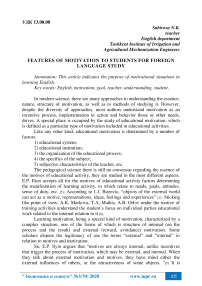Features of motivation to students for foreign language study
Автор: Sabirova N.K.
Журнал: Экономика и социум @ekonomika-socium
Рубрика: Основной раздел
Статья в выпуске: 3 (70), 2020 года.
Бесплатный доступ
This article indicates the purpose of motivational situations in learning English.
English, motivation, goal, teacher, understanding, student
Короткий адрес: https://sciup.org/140247855
IDR: 140247855 | УДК: 13.00.08
Текст научной статьи Features of motivation to students for foreign language study
In modern science, there are many approaches to understanding the essence, nature, structure of motivation, as well as to methods of studying it. However, despite the diversity of approaches, most authors understand motivation as an incentive process, implementation in action and behavior those or other needs, drives. A special place is occupied by the study of educational motivation, which is defined as a particular type of motivation included in educational activities.
Like any other kind, educational motivation is determined by a number of factors:
-
1) educational system;
-
2) educational institution;
-
3) the organization of the educational process;
-
4) the specifics of the subject;
-
5) subjective characteristics of the teacher, etc.
The pedagogical science there is still no consensus regarding the essence of the motives of educational activity, they are studied in the most different aspects. E.P. Ilion accepts all for the motives of educational activity factors determining the manifestation of learning activity, to which relate to needs, goals, attitudes, sense of duty, etc. [5] . According to L.I. Bozovic, “objects of the external world can act as a motive, representations, ideas, feelings and experiences” [1] . Sticking like point of view, A.K. Markova, T.A. Mathis, A.B. Orlov under the motive of training activities understand the student’s focus on individual parties educational work related to the internal relation to it [6] .
Learning motivation, being a special kind of motivation, characterized by a complex structure, one of the forms of which is structure of internal (on the process and the result) and external (reward, avoidance) motivation. Some scholars dispute the legitimacy of use the terms “external” and “internal” in relation to motives and motivation.
So, E.P. Ilyin argues that “motives are always internal, unlike incentives that trigger the process of motivation, which may be external, and internal. When they talk about external motivation and motives, they have mind either the external influences of others, or the attractiveness of some objects. "[5] It is difficult to disagree with these findings. However, for convenience, we will adhere to traditional terminology, meaning "internal" motives associated with the content of the educational material or the learning process, and under the “external” -motives that arose under the influence of external stimuli.
As noted by H. Heckhausen, the description of behavior according to the principle contrasts as motivated either "from within" (intrinsically), or “From the outside” (extrinsically) has the same experience as the experimental psychology of motivation. [8] We share the opinion of those authors who consider that internal and external motives do not exclude, but complement each other friend. For example, according to I.A. Vasiliev, external and internal motives play a different role: internal motives give activity personal meaning, and external - are actually the motivator activities. [3] From the point of view of E.P. Ilyin, motivation and motives are always internally determined, but may also depend on external factors, driven by external stimuli. However, most researchers recognize that for the successful mastery of IJ, the presence of internal motives, because in most cases, motives associated with external influences inferior in strength to those that are formed under the influence of internal motives of man.
Considering motivation, especially should focus on needs, defined as the orientation of activity, mental condition creating a prerequisite for activity. Without need not the student's activity is awakened, motives do not arise, he is not ready for setting goals. The teacher, first of all, must rely on the need for new experiences, turning into a cognitive need [2] , activate it, make it more clear, conscious. Cognitive need creates readiness for learning activities and to setting goals. Moreover, by cognitive motivation is meant such a motivation in which revealed unknown new knowledge coincides with the purpose of cognitive activity.
Sources used:
-
1. Божович, Л.И. Изучение мотивации поведения детей и подростков. Москва, 1972.
-
2. Бондаревская, О.И Психологическое изучение способностей к иностранному языку: Автор. дис. ….канд.психол.наук(19.00.01). – Ярославль:ЯрГУ им.П.Г Демидова, 1998.- 22с
-
3. Васильев, И.А. Роль интеллектуальных эмоций в регуляции мыслительной деятельности. Психологический журнал. 1998, Т.19, №4, с.4960
-
4. Дубовицкая, Т.Д. К проблеме диагностики учебной мотивации// Вопросы психологии, 2005 , №1
-
5. Ильин, Е.П. Мотивация и мотивы. – СПб: «Питер», 2000, 512с.
-
6. Маркова, А. К., Орлов, А. Б., Фридман, Л.М. Мотивация учения и ее воспитание у школьников. М., 1983, 64 с.
"Экономика и социум" №3(70) 2020
Список литературы Features of motivation to students for foreign language study
- Божович, Л.И. Изучение мотивации поведения детей и подростков. Москва, 1972.
- Бондаревская, О.И Психологическое изучение способностей к иностранному языку: Автор. дис. ….канд.психол.наук(19.00.01). - Ярославль:ЯрГУ им.П.Г Демидова, 1998.- 22с
- Васильев, И.А. Роль интеллектуальных эмоций в регуляции мыслительной деятельности. Психологический журнал. 1998, Т.19, №4, с.49-60
- Дубовицкая, Т.Д. К проблеме диагностики учебной мотивации// Вопросы психологии, 2005, №1
- Ильин, Е.П. Мотивация и мотивы. - СПб: "Питер", 2000, 512с.
- Маркова, А. К., Орлов, А. Б., Фридман, Л.М. Мотивация учения и ее воспитание у школьников. М., 1983, 64 с.


